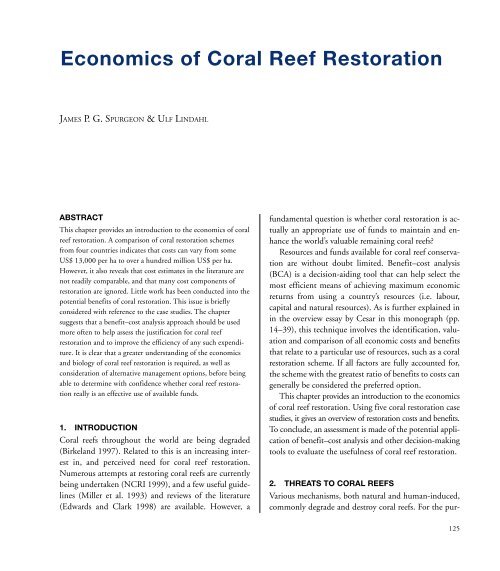Create successful ePaper yourself
Turn your PDF publications into a flip-book with our unique Google optimized e-Paper software.
<strong>Economics</strong> <strong>of</strong> <strong>Coral</strong> Reef Restoration<br />
JAMES P. G. SPURGEON & ULF LINDAHL<br />
ABSTRACT<br />
This chapter provides an introduction to the economics <strong>of</strong> coral<br />
reef restoration. A comparison <strong>of</strong> coral restoration schemes<br />
from four countries indicates that costs can vary from some<br />
US$ 13,000 per ha to over a hundred million US$ per ha.<br />
However, it also reveals that cost estimates in the literature are<br />
not readily comparable, and that many cost components <strong>of</strong><br />
restoration are ignored. Little work has been conducted into the<br />
potential benefits <strong>of</strong> coral restoration. This issue is briefly<br />
considered with reference to the case studies. The chapter<br />
suggests that a benefit–cost analysis approach should be used<br />
more <strong>of</strong>ten to help assess the justification for coral reef<br />
restoration and to improve the efficiency <strong>of</strong> any such expenditure.<br />
It is clear that a greater understanding <strong>of</strong> the economics<br />
and biology <strong>of</strong> coral reef restoration is required, as well as<br />
consideration <strong>of</strong> alternative management options, before being<br />
able to determine with confidence whether coral reef restoration<br />
really is an effective use <strong>of</strong> available funds.<br />
1. INTRODUCTION<br />
<strong>Coral</strong> reefs throughout the world are being degraded<br />
(Birkeland 1997). Related to this is an increasing interest<br />
in, and perceived need for coral reef restoration.<br />
Numerous attempts at restoring coral reefs are currently<br />
being undertaken (NCRI 1999), and a few useful guidelines<br />
(Miller et al. 1993) and reviews <strong>of</strong> the literature<br />
(Edwards and Clark 1998) are available. However, a<br />
fundamental question is whether coral restoration is actually<br />
an appropriate use <strong>of</strong> funds to maintain and enhance<br />
the world’s valuable remaining coral reefs<br />
Resources and funds available for coral reef conservation<br />
are without doubt limited. Benefit–cost analysis<br />
(BCA) is a decision-aiding tool that can help select the<br />
most efficient means <strong>of</strong> achieving maximum economic<br />
returns from using a country’s resources (i.e. labour,<br />
capital and natural resources). As is further explained in<br />
in the overview essay by Cesar in this monograph (pp.<br />
14–39), this technique involves the identification, valuation<br />
and comparison <strong>of</strong> all economic costs and benefits<br />
that relate to a particular use <strong>of</strong> resources, such as a coral<br />
restoration scheme. If all factors are fully accounted for,<br />
the scheme with the greatest ratio <strong>of</strong> benefits to costs can<br />
generally be considered the preferred option.<br />
This chapter provides an introduction to the economics<br />
<strong>of</strong> coral reef restoration. Using five coral restoration case<br />
studies, it gives an overview <strong>of</strong> restoration costs and benefits.<br />
To conclude, an assessment is made <strong>of</strong> the potential application<br />
<strong>of</strong> benefit–cost analysis and other decision-making<br />
tools to evaluate the usefulness <strong>of</strong> coral reef restoration.<br />
2. THREATS TO CORAL REEFS<br />
Various mechanisms, both natural and human-induced,<br />
commonly degrade and destroy coral reefs. For the pur-<br />
125


















